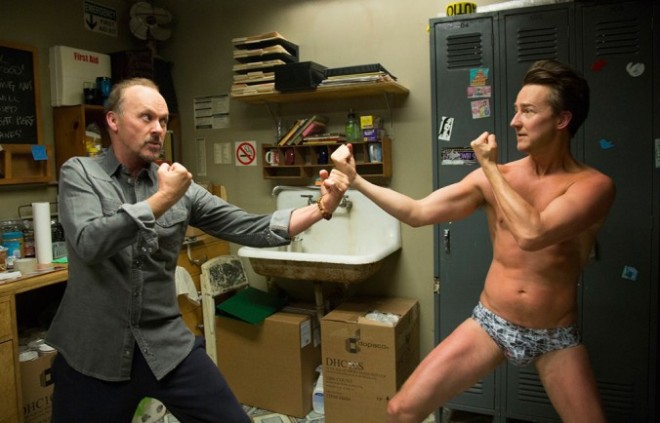Christopher Nolan is a filmmaker’s filmmaker, a creatively restless soul who challenges both himself to push the boundaries of his skills and his chosen medium, as well as to challenge the notions of viewers who show up for his movies. This is largely a good thing; his films occasionally feel overstuffed, but never fail to make one think about Big Ideas, though with Interstellar, co-written by the director and his brother/writing partner Jonathan, Nolan seems to struggle with making those deep thoughts mesh with the more down-to-earth melodrama he ties to them. For a movie about transcending the earthbound limitations of mankind, he seems firmly entangled in them, and as far as deeply meaningful space epics go, his science fiction epic is less 2001: A Space Odyssey and more 2010: The Year We Make Contact. That’s not necessarily a bad thing, but it does suggest that hardcore Nolan fans may want to temper their lofty expectations for this outing.
One of Interstellar‘s strong points is its refreshing reliance on science fact as a foundation for the science fiction, much like Gravity but with a broader scope. The movie is set in the near-ish future, after an economic and environmental collapse has turned much of the planet into the Great Depression 2.0: the economy is stagnant, technological development has stalled, and career options are limited due to the needs of a greatly reduced population relying on an even more reduced food supply. In short, humanity is about to be snuffed out by a global Dust Bowl.
Enter test pilot-turned-corn farmer Cooper (Matthew McConaughey), recruited by Dr. Brand (Michael Caine), head of a struggling NASA working underground, in both the literal and figurative sense due to massive budget cuts. Brand knows that mankind has at best a generation or so left before it goes the way of the dinosaur, and that only hope for the survival of the species is to find another planet to live on. Conveniently, a wormhole to another galaxy opened near Saturn more than a decade earlier; probes and a manned exploration mission was sent through, but never returned. Cooper and a small crew — Brand’s daughter Amelia (Anne Hathway), Doyle (Wes Bentley), and Romilly (David Gyasi), plus the robot assistant TARS (voiced by Bill Irwin) — are sent after them to find out which, if any, of the 12 potential worlds are habitable while Dr. Brand struggles to ready an ark of sorts.
 Cue a series of episodic misadventures involving the physics behind black holes, wormholes, time dilation, exotic planets, and the rigors and obstacles posed by the deepest of deep-space exploration. As dry as that may sound, it is during these challenges and plot devices that Interstellar is at its most engrossing. The fact that relativity means that while Coop’s voyage take a few years of his time while a couple of decades pass on earth creates a very real and very unusual ticking clock quandary for him and his crew; time becomes a resource for them to manage as much as their oxygen and food supplies, and the prospect that his children could be his age or older when he returns haunts him as much as it propels his actions. It’s material not often covered by a film genre often more concerned with allegory, blowing stuff up, or both.
Cue a series of episodic misadventures involving the physics behind black holes, wormholes, time dilation, exotic planets, and the rigors and obstacles posed by the deepest of deep-space exploration. As dry as that may sound, it is during these challenges and plot devices that Interstellar is at its most engrossing. The fact that relativity means that while Coop’s voyage take a few years of his time while a couple of decades pass on earth creates a very real and very unusual ticking clock quandary for him and his crew; time becomes a resource for them to manage as much as their oxygen and food supplies, and the prospect that his children could be his age or older when he returns haunts him as much as it propels his actions. It’s material not often covered by a film genre often more concerned with allegory, blowing stuff up, or both.
Despite the narrative possibilities posed by this, the Nolans’ story often feels clunky and stilted as it cuts between its terrestrial and cosmic story lines. The human drama comes across as a little hokey at times, the dialogue is often expository, and with the exceptions of McConaughey and Matt Damon (whose role will remain unmentioned and spoiler-free here) the actors are saddled with under-cooked roles. The final act veers into an ethereal tone that feels rather silly in execution and appears to abandon the hard-science it relied on up to that point in favor of a deus ex machina conclusion.
On a technical level, Nolan delivers just as much as he always has and then some. His love affair with the 70mm IMAX format continues passionately, and he and cinematographer Hoyte van Hoytema (Spike Jonze’s Her) deliver some truly breathtaking starscapes. The prerequisite action beats are top-notch. More importantly, despite its flaws, Interstellar succeeds in prying us out of our sci-fi comfort zone.
And while the ride is a bumpy one and the destination is a bit of a letdown, getting there is a trip.

Birdman: The material isn’t as morose as Amores Perros or 21 Grams or Babel, but it is just as challenging
A bizarre hybrid of a midlife crisis comedy and a backstage drama, Alejandro González Iñárritu’s Birdman or (The Unexpected Virtue of Ignorance) is the kind of philosophical and challenging film for which the director is known surprisingly pitched with a playfulness that he’s never used before. The material isn’t as morose as Amores Perros or 21 Grams or Babel, but it is just as challenging, and visually it is his most virtuosic work to date.
Michael Keaton has already racked up considerable buzz for his performance as Riggan Thomson, a screen actor who — in a parody of Keaton’s own career — gained international acclaim in the 1990s by starring in the Birdman superhero movies before stepping away from the franchise for more serious work.
The movie introduces to Thomson in the present; he’s now a has-been remembered solely for the Birdman movies, trying to re-invent his career by writing, directing, financing, and starring in a pretentious Broadway adaptation of Raymond Carver’s short story “What We talk About When We Talk About Love”. It’s the day before preview night, and things aren’t going well. He’s threatened with a lawsuit after a co-star is injured; the subsequent replacement, Mike Shiner (Edward Norton), is a bad boy who’ll draw an audience, but seems determined to wreck the production as well; his female lead/girlfriend (Andrea Riseborough) may be pregnant; and Thomson is at loggerheads with daughter Sam (Emma Stone), fresh out of rehab and working as his assistant.
It’s a lot of pressure on one man who’s already starting to crack — the opening shot of the movie is of Thomson meditating in his dressing room, clad only in tighty whities, sitting cross-legged, and floating a few feet off the ground (you read that correctly — and his grip on reality loosens as the pressure increases. Delusion creeps in, and Thomson begins seeing and hearing some very odd things, including the voice of his Birdman alter ego, imploring him to knock off the pretentious crap and don the costume again for a Birdman 4.
Iñárritu and co-writers Nicolas Giacobone, Alexander Dinelaris, and Armando Bo send Thomson along a fine line between delusion and magical realism, and the way the director blurs the lines between reality and whatever the hell it is that’s happening to Thomson onscreen is nothing short of astounding. First and foremost, Birdman is filmed in the guise of a single uninterrupted take, a string of tracking shots that follow the actors around the stage, into the bowels of the theater, into its rafters, onto its rooftop, around the streets, and in through windows in ways that Alfred Hitchcock always dreamed off but never had the technology to pull off. Just as impressively, Iñárritu and company compress time while doing this, allowing the story to play out over a couple of days without a visible cut, working in Thomson’s strange hallucinations — from moving objects to giant bird-monsters — into the scenes with and without use of CGI. (In fact, one of the best of such moments is one of the movie’s simplest: As Riggan and Shiner walk down a busy New York street they pass the drummer who’s been playing the movie’s soundtrack for the past hour or so, in a perfectly seamless audio mix.) It’s a near-seamless concoction of onscreen surrealism that would make the likes of Terry Gilliam, Michel Gondry, and Spike Jonze green with envy.
All of which would be for naught if not for Keaton’s soul-bearing performance. Riggan Thomson is an exaggerated version of the man, for sure: Keaton’s career never really tanked after he walked away from the Batman franchise, it just slipped under the radar as he opted for less high-profile work. Still, there is that perception about him — and Norton, as well, after he parted ways with the Hulk. Both actors take sporting pot-shots at themselves, as well as a few off-the-cuff jabs at Robert Downey Jr., Jeremy Renner, and others riding the superhero super-stardom zeitgeist, as if to offer a warning: “We were there once. Trust us — you’ll want to have an exit strategy for when then time comes to take the spandex off.”






